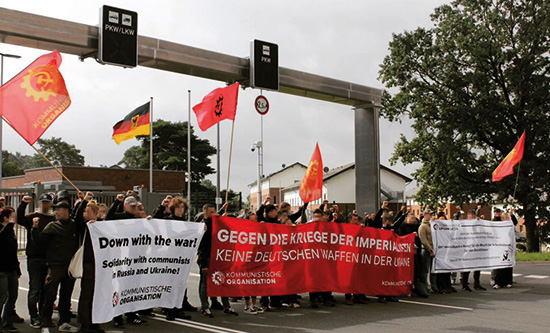
During a summer camp organised by the Germany-based Communist Organisation in August, FRFI had the opportunity to interview Ukrainian and Russian communists from three separate organisations: the Union of Communists of Ukraine (SKU), the Workers Front of Ukraine (RFU) and the Revolutionary Communist Youth League (Bolshevik) from Russia (RKSMb). These organisations are at the centre of ‘Down with the war!’ (Nieder mit dem Krieg!), a solidarity campaign with communists in Ukraine and Russia who are fighting against both imperialist sides and defending the interests of the working class. In this interview with ALEXANDER TROME, they present their theoretical and practical views on the current war.
FRFI: How do you understand the nature of the war?
RFU: This is unmistakably an imperialist war which perpetuates the competition between Western and Russian capitalists and which we oppose in the name of the interests of the working class. Being on the fringes of the global capitalist system, not being an imperialist country, Ukraine is not a subject but an object in this conflict: a bargaining chip in the division of the spheres of influence between Western and Russian capital. We do not seek solidarity from either of these sides; rather, our focus is on fostering solidarity within the Ukrainian and Russian working class, as this represents the only antidote to the imperialist war.
FRFI: How has the intensification of repression affected your activities?
RFU: Repression against communists in Ukraine did not start in 2022 but rather in 2014. Since then, the Ukrainian communist movement has become the target of a continuous attack through legal and illegal means, posing a threat to organisations and individuals alike. This repression has steadily increased and has now reached its peak. The bourgeois rule of law is frequently supplanted by special operations conducted by state security and paramilitary forces, often harbouring sympathy for Nazi ideologies. They’re able to enter your house, hit you and torture you there, without any legal basis. If they want to continue with you, they don’t take you to the prison but to the underground, where they can carry on indefinitely.
FRFI: What is your political evaluation of the Russian government?
RKSMb: We believe that Russia is not yet fascist, but simultaneously there’s an evident emergence of a fascist tendency, which has been ingrained in Russian imperialism over the past 15-20 years. So, while it propagandises to fight fascism in Ukraine, within Russia itself fascist tendencies are gaining momentum, as the dictatorship of the bourgeoisie is becoming increasingly repressive and terrorist. Different sections of the Russian capitalist class are moving towards fascism, including the one supporting the government. Their disagreement is around questions of who will lead this new fascist regime, and the methods and timings through which it will be established.
FRFI: What is the role of the Azov Brigade right now in Ukraine?
SKU: Since the beginning of the war, the Azov Brigade has experienced significant growth. However, its influence within civil administration and parliament remains relatively limited, as nationalist parties have never performed well in elections. Their power comes directly from the government, which in turn represent Ukrainian capital and entrusts them with key operations, often alongside the police and army, precisely because of their extra-legal nature. In their ranks there are mostly right-wing criminals, but they’re controlled by the Ukrainian state and advised by the West.
FRFI: Is there any similarity with the Wagner Group?
RKSMb: The Wagner Group is a private military company that has emerged as a tool of Russian imperialism, effectively advancing Russia’s international objectives in situations where deploying conventional military forces was unsuccessful. When Russian military personnel had losses or low motivation, the government has turned to highly skilled and well-equipped mercenaries. This happened in Syria, Libya and the Central African Republic before Ukraine, but here the military lack of progress has brought about a significant shift in this dynamic, resulting in divisions within the Russian bourgeoisie.
FRFI: What role did the Donbass play at the beginning of the war?
SKU: The establishment of the Donetsk and Luhansk People’s Republic was a reaction to the 2014 Maidan coup. Initially anti-fascist elements played a significant role in creating the Republics, but control quickly shifted to Russian forces. Initially, these forces repressed those in power, but they soon turned their attention to anti-fascists and communists, who have a strong presence in the region due to its historical working-class orientation. Russian interests always revolved around exploiting the region’s mineral and industrial resources, rather than combating fascism or protecting the population.
FRFI: What are your organisations doing in this challenging context?
RKSMb: Presently, it’s nearly impossible to conduct overt actions against the war in Russia and therefore we’re using indirect means of propaganda to agitate. We’re establishing a workers’ correspondence network in which isolated members provide information on specific workplaces and regions. Additionally, we’re collaborating with other organisations such as the Russian Labour Front to support various strikes that challenge the narrative the government seeks to present. For example, in a campaign against the layoff of post office workers, we emphasised the connection between workers’ redundancies and the current war.
While we cannot directly and openly address this issue, we are doing our utmost to underscore the link between Russia’s economic, geopolitical and political crises.
The full version of this interview can be read on our website: www.frfi.org.uk
FIGHT RACISM! FIGHT IMPERIALISM! 296 October/November 2023




